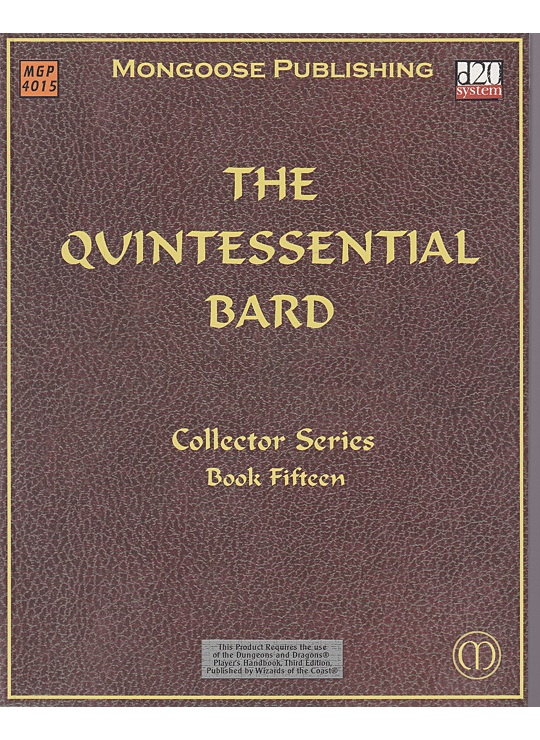The Quintessential Bard I Paperback
9781903980972
Levering 2-3 Werkdagen
Thuislevering
Laat dit stripboek afleveren bij u thuis
For those not familiar with the Quintessential books, this one kicks off with the Character Concepts chapter, a range of simple templates designed to be applied to beginning characters to subtly alter the core class. By taking a Character Concept, a Bard will suffer a penalty in one area but gain a benefit in another - this is primarily a roleplaying tool for players looking for a character who is a bit different from the normal run of the mill. For example, as a Bard you can now start as a Alderman, Ambassador, Artist, Aspirant, Cantor, Explorer, Law Keeper, Lore Master, Minstrel, Naturalist, (not Naturist. . .), Skald, Stormcrow, Talespinner, Trickster or Vagabond. The Prestige Bard covers avenues players may wish to explore when they come to specialise their Bard in one or more areas. As a Bard increases in level, he can choose to adopt the role of Dream Dancer, Elder, Grandmaster, Jester, Seneschal, Singer of the Dawn, Soul Taker, World Singer - or a combination of several. The Tricks of the Trade chapter gives Bards 'cool things to do', as I always describe it to our writers. It kicks off with many new uses for skills, such as using Gather Information to support Bardic Knowledge or Intimidate to bully. Assisting Actions allows a Bard to use his music in a non-magical manner to help others achieve their goals through Battle Hymns, Chamber Music, Folk Dance, Harvest Songs, Lullabies and Marching Songs, all of which also permit a Bard to specialise in the kind of music he performs. Finally, Professions allows a Bard to ally his musical talent with public performances, allowing him to adopt the roles of such things as Street Magicians, Town Criers and Animal Charmers - even if a player is not interested in pursuing such things (and who doesn't want a few extra gold on the side), then there is plenty of meat here for Games Masters to set urban scenes in their scenarios. This is followed by Bardic Feats, which allow a Bard to specialise in certain areas, taking advantage of his innate talents. He can choose to gain feats that allow him to Gossip, learn Elven Dreamweaving, become a Geographer or any one of 22 other feats. Tools of the Trade begins by looking at the qualities of Masterwork Instruments, leading into Invested Instruments - the development of seemingly magical powers as a Bard forms a close bond with his instrument over time. Magical Instruments are covered in depth with such items as the Chorus Harp and Rain Staff available, while Exotic Items covers more mundane objects such as a Metronome and Magician's Chest. Rules are also presented for Magical Crafts, for those Bards looking to produce art more permanent than tale or song. At the cost of a feat, a Bard may create sanctified architecture, magical candles, enduring embroidery, engravings of no little power, glassblowings that can capture flame, paintings that change appearance with the things they represent, pottery that will never permit food to rot , sculptures that can manifest voices and weavings that can make the lowest peasant seem noble. Finally, Magical Compositions represent lost items of Bardic lore that can be used by several performers to create castings that dwarf the abilities of a single Bard. Of all the Tricks of the Trade chapters we have done in the past, this is probably the greatest in scope! The Power of Lore concentrates on the Bard's knowledge capabilities and gives extra guidelines in its use, plus a few tips on circumstances in which its use may not always be obvious. Using this chapter, Bards can now find themselves far more intuitive, able to predict the actions of enemies or even memorise far for information than most people will ever know. The Mysteries of Music allow Bards to study their arts to far greater depth than has ever been possible before, unlocking the great secrets of legends who have come before them. There are 18 Mysteries detailed, all relating to a certain type of performance - the Great Harp, for example, or the C


